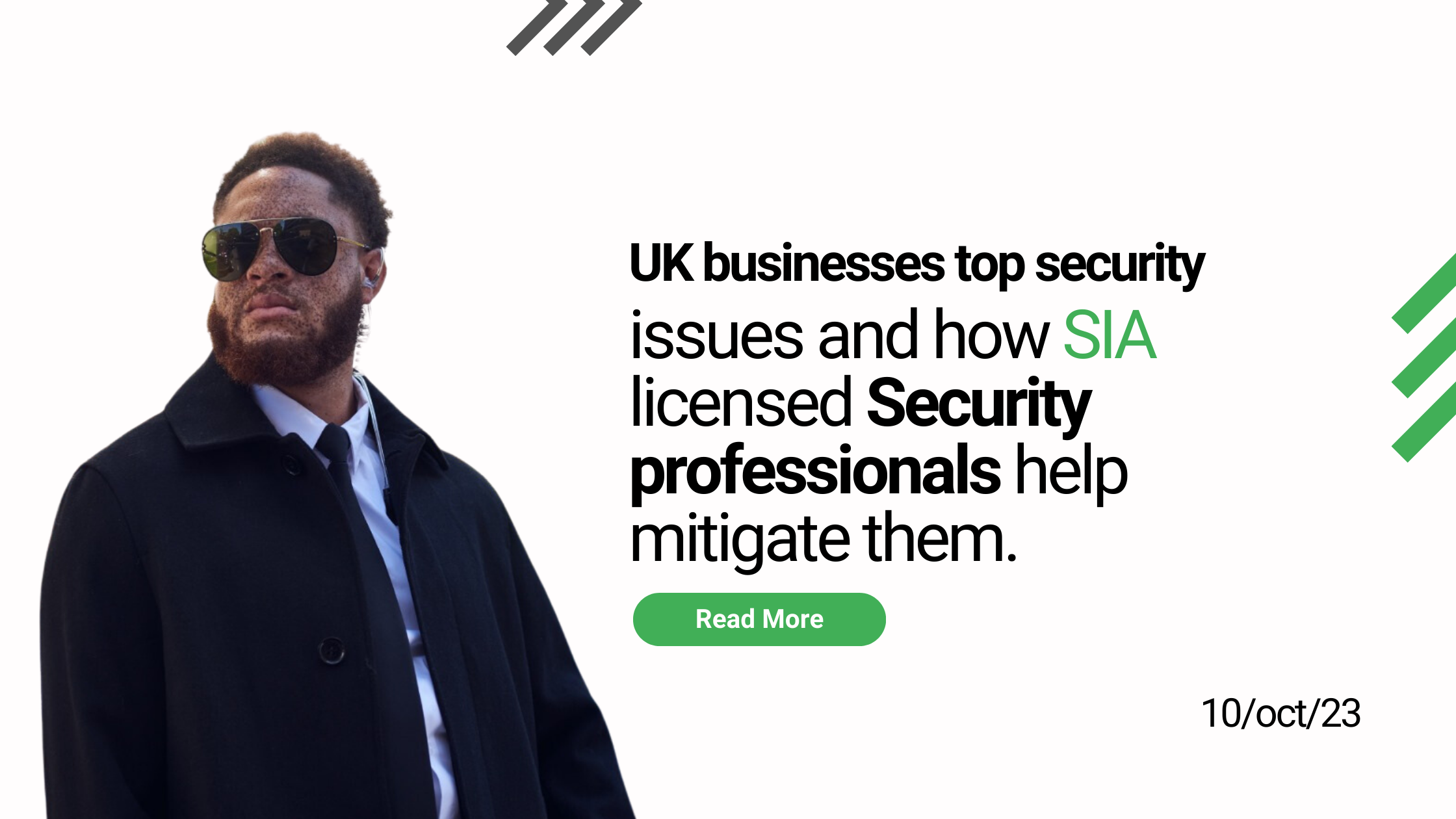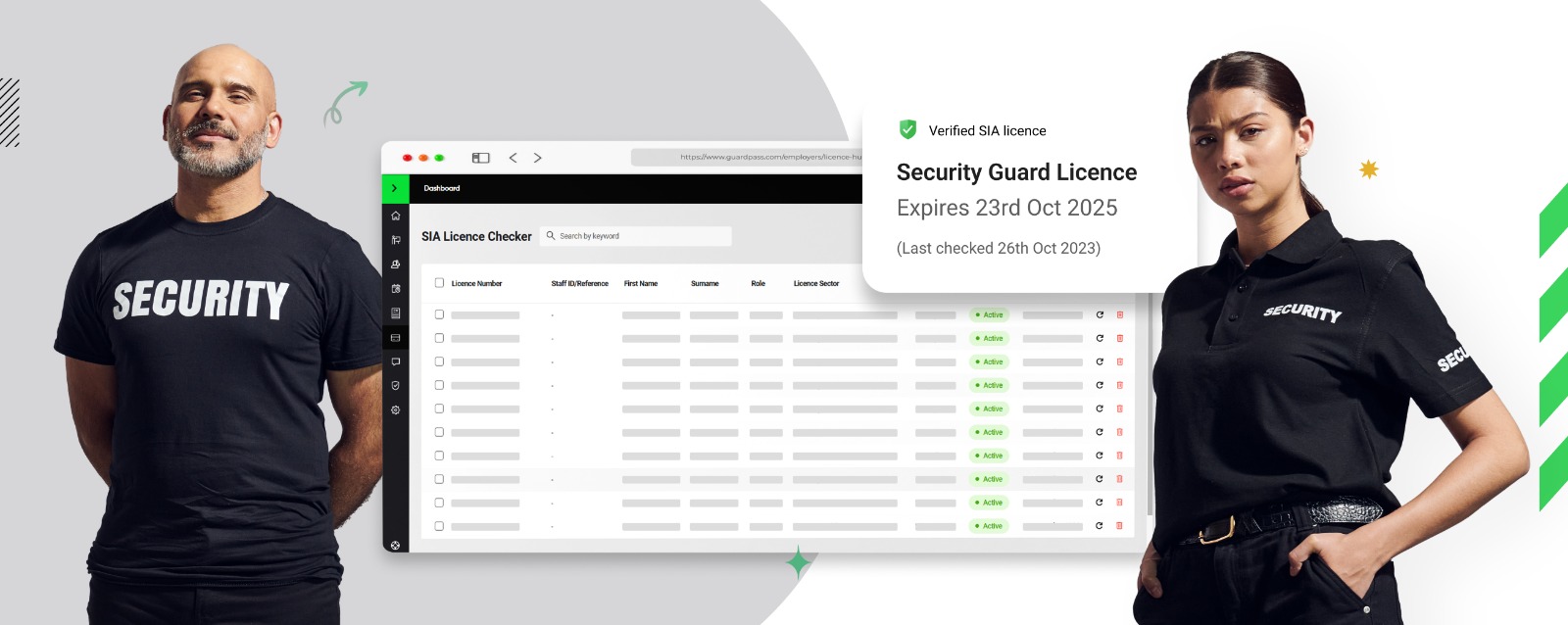So many poorly informed business owners seem to be of the opinion that they can get along just fine without using security guarding services. Security is viewed as just a drain on the bottom line.
Well let’s have a look at just why security is a vital business necessity, and not a waste of time or money…..
Theft and burglary
The bread and butter work of Security Officers, to deter and detect crime, is more important today than it has ever been. At a site I attended last year, a trespasser had gained access using someone else’s (lost or stolen) electronic access card. The security officer at the desk was concerned that he didn’t seem to recognise the guy that used the card, and he followed the individual on CCTV. The Security Officer took a decent quality still shot of the suspect and immediately confirmed with the building manager that this was not a member of staff. Our Security Officer was waiting outside the server room that had been accessed by the trespasser, as he attempted to leave with an arm full of electronic equipment. One detained by Security and later convicted of Burglary. Result.
Without security, thousands of pounds worth of equipment would have gone, and business continuity would have been gravely damaged as the stolen servers contained much of the company’s backup data.
Criminals and vandals alike, are now more active and disruptive than ever. A lack of Police available to enforce the law or investigate crime, has emboldened those with malicious intent to behave in a way that was unheard of 20 years ago. The visible presence of a uniformed Security Officer, or ideally more than one, makes the nefarious plans of these criminals far less comfortable, and more risky, to perform.
But you know all that.
Terrorism
Sadly, these days, there is an ever present threat of terrorism, with the most horrific actions performed by numerous flavours of hate filled fanatic. Security has a crucial role in the detection, disruption, and reporting of suspects, and potential hostile reconnaissance activities. The free online ACT (action counters terrorism) courses are now a compulsory part of mandatory Security Industry Authority training, for very good reason.
Most terrorist attacks require a target reconnaissance, which allows the terrorist to plan their attack to have the maximum chance of success and cause the greatest possible death and destruction. There is nothing more disconcerting for a terrorist, busily making notes on, or taking pictures of, a potential target site, than to have a Security Officer walk up to them, and ask if they require any assistance, or can they provide directions. Knowing that security is so proactive, makes attack planning impossible, and will likely rule out that site as a potential venue for an attack.
Security Officers will be the ones to report suspicious activity to the Security Services, and in the event of any suspect incident, they will have a vital role to play in the evacuation of staff and visitors.
With the new, hopefully forthcoming, Protect Duty, or “Martyn’s Law”, coming in to force, having appropriately trained and drilled Security Officers, will fulfil much of the site management’s duty of care, and new legal responsibilities.
Fire or flood.
Routine site patrols are another basic security duty. These patrols fulfil the needs of the Health & Safety at Work etc Act, with Officers performing tasks like moving items away from a blocked fire escape route, ensuring that fire fighting equipment is in place and operational, checking that safety signage and lighting is present and working, and much more. It is a regular occurrence for Security Officers to find sinks or toilets blocked, and if a dripping tap had not been turned off, or the water turned off to prevent a toilet from overflowing, the damage this sort of flooding can cause if not caught early, can be catastrophic. A lot of water can accumulate over night or at the weekend, a potential problem that any Security Officer will detect during a first patrol, and deal with. Disaster averted, but nobody sees the chaos that security prevents!
Security Officers are also trained to deal with other Health & Safety issues. Trip hazards can be removed or reported. Faulty equipment can be switched off. Paper, rubbish, or sources of fuel can be moved away from heaters, light bulbs, or other sources of ignition. Overloaded plug sockets or extension leads can be reported and unplugged.
All of these actions may prevent serious incidents from occurring, and prevent damage to property or injury to staff or visitors…… But a few lines in a daily occurrence book doesn’t portray the value of the simple actions taken by Security Officers.
Industrial espionage & cyber attacks
What on earth have Security Officers got to do with these kinds of issues?
Physical security personnel have a massive role to play in the prevention and detection of these issues. Clever criminals or competitor companies, use a variety of ways to obtain information. Many of these ways can be circumvented by good security policies and vigilant Security Officers.
Cleaners or contractors can often be the cause of data breaches, selling information or even working for a hostile organisation. Laptops left out on desks over night or at the weekend are always a potential source of valuable and damaging data. Confidential files left on desks out of hours or when the staff member is not present, is another. Security Officers enforcing “clear desk policies” can record, remove, and properly secure unattended files or laptops. Filing rooms will be checked to ensure that they are locked when not in use. Files and computer monitors visible through windows can be moved, and most importantly, company employees can be educated in how to properly secure their data.
Confidential waste bins left unlocked, or overflowing, are also a valuable source of potentially damaging information. Security Officers will lock these when found open and report bins that are nearly full, so that removal and destruction by an authorised company can be arranged.
Even more devious ways are often used by hostile agents that want to gain access to a company’s computer systems. An old favourite technique was for a couple of USD thumb drives to be dropped in the company car park or lobby. It is natural for a finder to plug this drive in to a computer to see who it belongs to and hopefully return it. Alas once inserted in to a company computer’s USB socket, the drive will instantly download a Trojan Horse. This is a piece of software that quietly sits on a computer system and can provide remote access for the originator, or be designed to perform numerous other damaging actions.
Staff should be educated about this type of attack and all such items found, should be immediately handed in to security.
When found during patrol, or handed in by staff, security can identify these malicious memory sticks, and will record the time and location found, then report this to a site security manager or building manager, who will likely destroy the item, or have it investigated by experienced corporate counter surveillance professionals.
Malicious trespass
There is little more disruptive for a company’s operation than to discover on Monday morning that the company car park is now home to 20 traveller caravans, the pretty flower beds are now being used to empty toilets, and the company van left on site at the weekend is now up on bricks, windows smashed and all contents now missing. A Security Officer, properly locking down the building and securing the car park gate or raising the access bollards, on Friday evening, could have avoided all of this.
Should your company become target of some form of protest group, and suffer the annoyance of several dozen unwashed trouble makers trying to occupy the company lobby and throw lots of paint around, what would you do? You’d call security and a couple of Officers can secure the front doors letting legitimate staff and visitors in and out as required, whilst monitoring the behaviour of the protestors and possibly utilising another exit as a safe point of entrance and exit to site. Well done security.
Injury to staff or visitors (Accidents)
Accidents happen. From someone slipping on the marble floor in the lobby and hitting their head, to Sandra in sales cutting her finger quite badly on a particularly sharp envelope. Security Officers must now complete a First Aid course as part of the new SIA mandatory training regime, and will be there to assist. They will also be experienced in completion of the accident book, replenishment of any First Aid supplies used, and whether RIDDOR would be applicable. More importantly, they will be able to assess whether an injury will require professional treatment, and can summon and liaise with the ambulance service if required.
Summary
So much of what Security Officers do, prevents problems from arising. By definition, as “nothing happened” some companies are unable to understand the true value of physical security.
Until the muck hits the fan!
Don’t wait for a disaster to occur before you see the light and finally buy physical security services. Professional Security Officers will keep you safe. They will keep visitors and the public safe. They will protect your premises, your property, confidential data and will massively reduce the risk of accidents. Best of all, quality security staff will be a fantastic ambassador for your company and enhance your corporate image. Just don’t expect to buy professional, image enhancing security personnel, at cheapo prices. You get what you pay for here, as anywhere else.
Estimated reading time: 5 minutes



